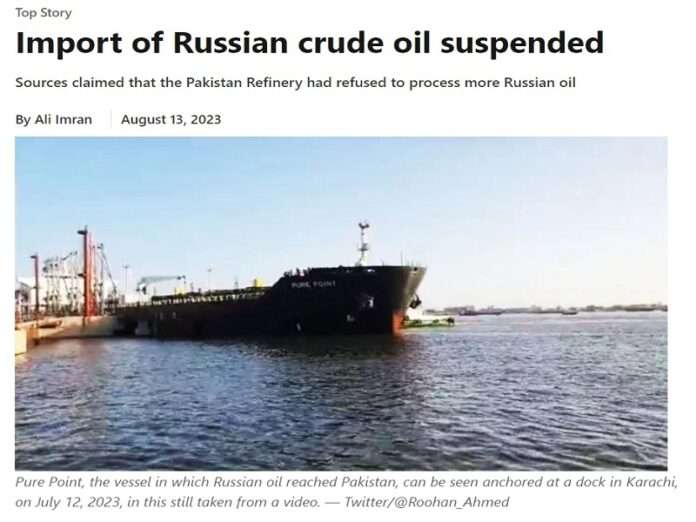The News International cited unnamed sources on Sunday to report that Pakistan suspended its import of Russian crude oil on the pretext that it’s not affordable to refine despite its lower price due to the lesser amount of petroleum that’s produced when compared to competitors’ crude. The problem with this explanation is that these refining differences were known ahead of time but the whole point in importing Russian crude was to get it at a lower price and reduce dependence on the Gulf Kingdoms.
Former Petroleum Minister Musadik Malik, who the abovementioned report claimed had insisted in vain on his country’s companies importing more Russian crude, earlier envisaged Moscow providing over one-third of his country’s needs. Nevertheless, it also deserves mentioning that he was reported to have told the National Assembly last week that Pakistan planned to officially pull out of its decade-old gas pipeline deal with Iran under pressure from US sanctions in spite of this project’s promising potential.
The precedent is therefore established for suspecting that US sanctions might also have played a role in Pakistan’s reported decision shortly thereafter to suspend its Russian crude oil imports too. Taken together, the impression is that the fascist post-modern coup regime that was installed after former Prime Minister Imran Khan’s (IK) scandalous ouster in April 2022 decided to destroy any hopes of energy security and the sovereignty it entails as their “parting gift” around the time of parliament’s dissolution.
This development is supposed to precede the next elections by 90 days, but there might be a delay since the latest census results require redrawing constituencies, which might not be completed within the next three months. In any case, the point is that IK’s replacements left a legacy of energy insecurity and lost sovereignty, not to mention economic collapse and the de facto imposition of martial law. The first two consequences are the most relevant to this analysis and will therefore be elaborated further.
The Intercept published a leaked copy of the Pakistani cable from March 2022 sent by its former Ambassador to the US warning about American pressure over Russia. His interlocutor, Assistant Secretary of State for South and Central Asia Donald Lu, made no secret of the fact that the US considered IK’s energy-driven ties with Russia to be a threat to its national security. For that reason, Washington signaled that it wanted him gone otherwise there’d be severe consequences for Pakistan.
IK’s subsequent removal a little over one month later predictably led to his replacements dillydallying on the strategic energy deal that he sought to advance during his trip to Moscow in late February 2022. Although they eventually imported a test shipment of Russian oil earlier this summer, the over year-long delay between his meeting with President Putin and their purchase was suspicious. It now appears in hindsight that the only purpose of going through with this was to push a domestic political agenda.
The regime probably never intended to implement Musadik’s ambitious plans but instead sought American permission for the previously mentioned purchase solely to claim that it supposedly proves that they weren’t installed by the US as punishment for IK’s Russia policy. Following this first-ever import and the superficial fulfilment of their soft power objective, they then spent the rest of the summer sending false signals to Russia that they were on the brink of finally reaching that strategic energy deal.
It can only be speculated whether the former Petroleum Minister was in on this plot or if he sincerely came along to realizing the wisdom of IK’s plans in this respect and truly wanted them to succeed, but that doesn’t change the ultimate outcome either way. At the end of the day, Pakistan strung Russian experts and negotiators along for over a year despite nothing coming of the latter’s efforts, which they continued in good faith with the intent of strengthening their partner’s energy security and sovereignty.
Pakistan’s reported suspension of Russian crude oil imports probably also dooms their plans for the Pakistan Stream gas pipeline, which was supposed to become the flagship Russian project in Pakistan and an anchor for more future investments. The Kremlin might not want to waste any more time negotiating with Islamabad after feeling like it was just fooled for over a full year, and the bad blood between them over these two failed deals could prevent their ties from ever becoming strategic.
Private businessmen will still try to scale real-sector trade between their countries, and ties will remain cordial at the official level, including at multilateral fora on Afghanistan and other issues of shared interests. What’s expected to change, however, is that Russia will no longer continue to treat Pakistan like a potential strategic partner after this debacle. In practice, it won’t consider that country worth the opportunity cost of investing its time in at the expense of expanding ties with more serious partners.
Its finite human resources are better invested in Africa nowadays, whose countries are sincere in their desire for strategic relations with Russia, unlike Pakistan which just wasted over a year dillydallying on a strategic energy deal only to ignominiously abandon it on a misleading pretext. The fascist post-modern coup regime’s “parting gift” to the Pakistani people around the time of parliament’s dissolution ahead of likely rigged elections was that they killed the chance for strategic relations with Russia once and for all.







